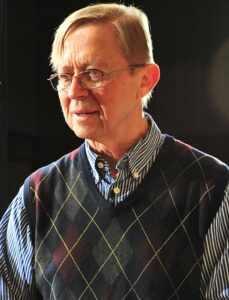Maslanka, Symphony No. 4

Hank wanted to feature David Maslanka (1943-2017) in our Friday Performance Picks and, knowing that I have a particular interest, asked me to write about it.
In the 1980s, a new generation of largely American composers started to rise. They did not share their professors’ devotion to the mathematical worlds of atonality or twelve-tone serialism. Innovation for the sake of innovation lost its status. Melody trickled back in, as did graspable harmonies and clearer musical form. By the turn of the 21st century, this generation, and another one right behind it, started to rock the musical world with fabulous new pieces.
My direct experiences with this new music began more than twenty-five years ago when asked by the Executive Director of the Dallas Winds, Kim Campbell, to inaugurate a series of pre-concert lectures for that ensemble. Considered America’s finest civilian wind ensemble, the Dallas Winds was known for its catchy motto “Have fun, Make Friends, Be Amazed.” I was intrigued particularly with the “amaze” part, but cautioned Kim, “How will this work? I don’t know the wind repertoire.” “You’ll learn it,” he said. “That’ll be the fun part.”
How right he was. Expecting to be immersed in a sea of band music from the 19th and early 20th century. I found myself thrown into an ocean of exciting new pieces for every concert, many of them penned by American composers absolutely new to me. But unlike that moniker of “new music” that had driven audiences away in the 1950s, 60s, and 70s, this was a new kind of “new music” capable of riveting listeners.
And even more delicious, I was able to enjoy contact with many of the composers. Whenever they were able to appear at the concerts (sometimes even conducting), they also frequently came into my pre-concert talks. You can imagine how exciting that was for the audience and for me as well! Working with the Dallas Winds involved the added bonus of working with its conductor, Jerry Junkin.
Fast-forwarding to the present, Mr. Maslanka, alas, has left this earth, but his music continues to grow in stature and popularity. Recordings of his works abound. In fact, I had the joy of writing program notes for one of these CDs recorded by the Dallas Winds that offers the shimmeringly beautiful work A Child’s Garden of Dreams and the Fourth Symphony you will hear below. Bands and orchestras across the globe perform his works with increasing frequency.
Below, you will see Maslanka’s wonderful Symphony No. 4 (1993), played by the University of Texas Wind Ensemble, conducted by Maestro Junkin. Junkin is one of the grandest conductors I’ve ever known (and one of the most amicable and kind). His work with both youth and professionals in Texas and around the world attests to his almost impossible-to-contain passion for music, new American music in particular. Through his career, he has worked with so many composers who are bringing a new era in music to life. When listening to these young (college, graduate-student aged) musicians perform this work, I’m reminded that they have grown up in a time when the sterile, often abstract, largely non-lyrical, and overall baffling musical experiments of academic composers starting in the 1950s have lain outside of their experience. These musicians know that era of repertoire. And they can perform it. But for their lives, they expect music to be lyrical, rhythmically exciting, colorful, vivid, and engaging . . . as music always was, until, well, until the post-World War II avant-garde took over the concert hall.
But the halls are open again, and works like this one are filling the stages. So welcome to the world of Maslanka, and may this piece set you off to explore more of his vast catalogue of dynamic, beguiling works.



